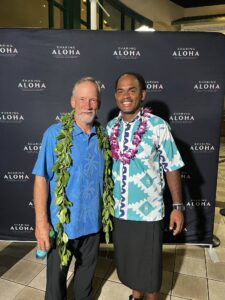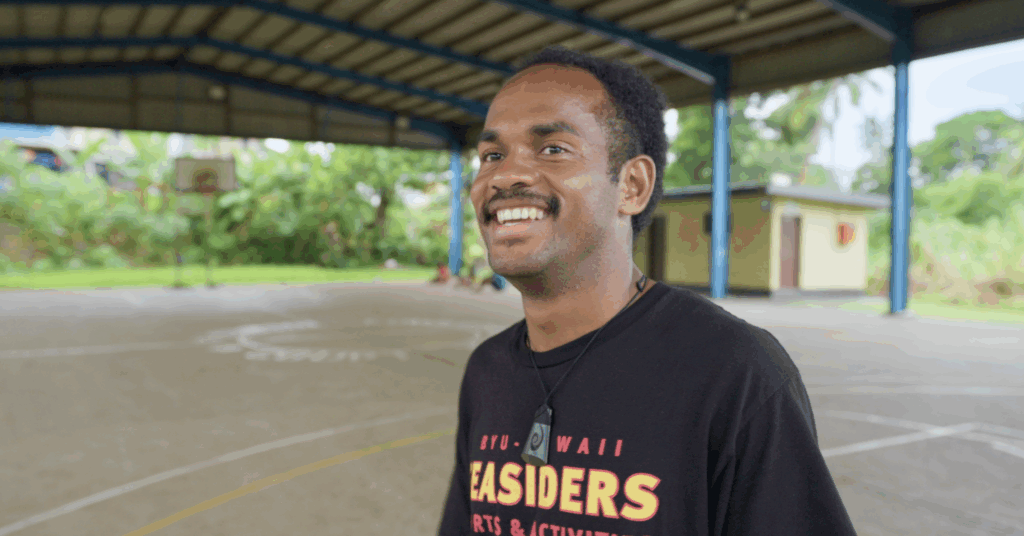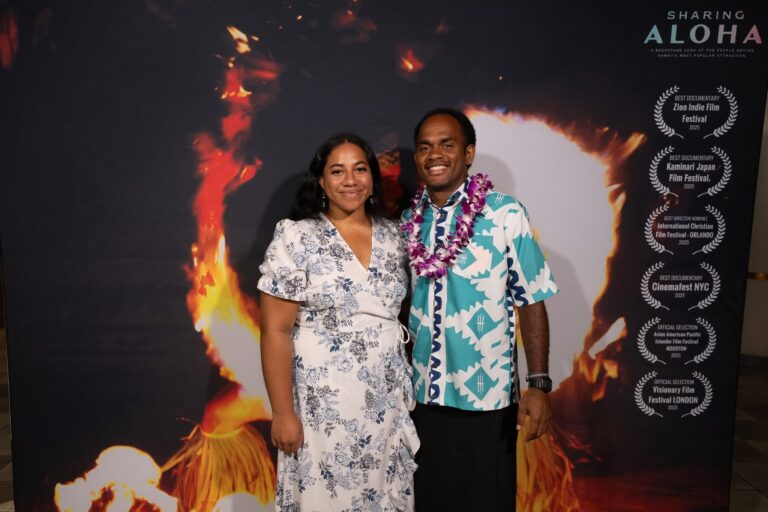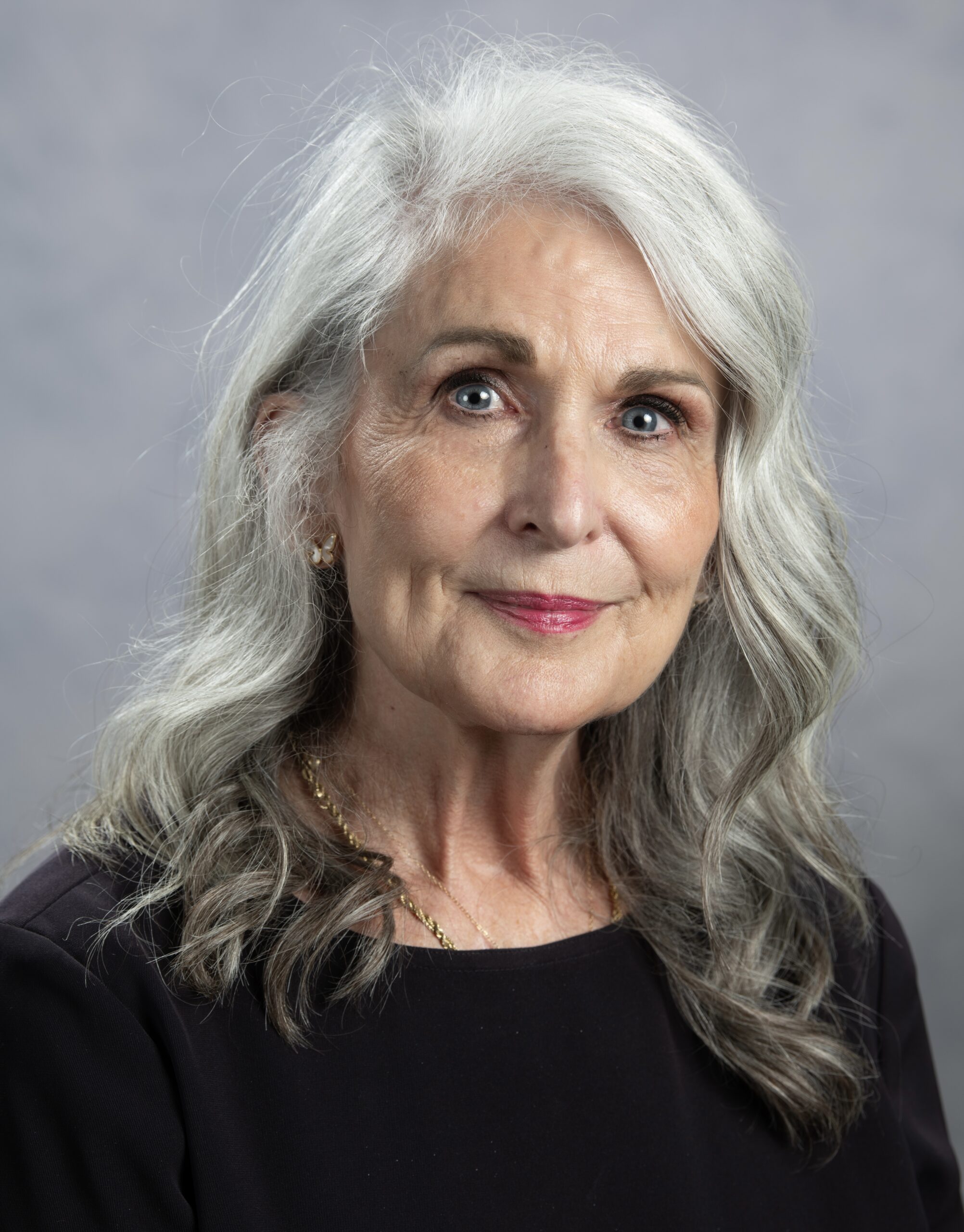From Raiwaqa to the World
Timoci (Jimmy) Keen grew up in Raiwaqa, a settlement in Suva, Fiji’s capital city known for its toughness – often compared by its inhabitants to “the Bronx of New York City” – where drugs and violence are a part of everyday life.
His story was featured in Sharing Aloha, a documentary that explores the relationship between the Polynesian Cultural Center (PCC) and the BYU–Hawaii students who make up about 80 percent of its employees. Most recently, Jimmy performed as a dancer in HĀ: Breath of Life, the Center’s premier night show. He is now attending the university, majoring in political science and Pacific Island studies.
 Timoci with Blair – director of the Sharing Aloha Movie, at the premiere screening in Downtown Honolulu.
Timoci with Blair – director of the Sharing Aloha Movie, at the premiere screening in Downtown Honolulu.
Jimmy’s journey has been marked by both hardship and opportunity. His early childhood in Western Fiji was shaped by the stark contrast between an abusive and authoritarian father at home and the structure and safety he found at a local Catholic grade school. At both places, however, he learned discipline, respect, and the importance of manners—“please,” “thank you,” and “excuse me”—values deeply rooted in Fijian culture. And he was blessed with a devoted mother who had been raised a member of The Church of Jesus Christ of Latter-day Saints.“When my dad was in the picture, home was unsafe. You come home something might happen, you never know. He may attack you or your mother. So that was hard, you want to defend your mom, but you’re small and that makes it worse. I always told myself, man you wait until I grow up. You try to hurt her, I’m going to knock you out.”
Now that he’s older, Jimmy has resolved those feelings and understands his father had his own troubling upbringing. He no longer has the “get even” mentality he carried as a small child and has let go of the anger and hurt.
“I try to help when I can. I feel grateful for some of the good things he taught me. My own upbringing allowed me to stand firm in what I believe, to voice my opinion. Something he taught us is that respect goes both ways.”
A Humble Home and Daily Discipline
When the abuse at home became unbearable, Jimmy’s mother moved with her four children back to Suva, where he was born, to be near extended family. He was about nine years old when he started attending a school operated by the Church.
In the modest home belonging to their great-grandfather, the children slept in a single room alongside their mother on mats that were carefully folded every morning and placed in the corner—allowing the space to morph into the kitchen/living room during the day. Each morning began with chores before a humble breakfast:
“Before breakfast you have a job, you do something like raking the yard or taking out the trash. You take care of the chores first. Grandfather would buy a packet of biscuits. We weren’t wealthy or rich so we would have 3 each, sometimes spread with a little butter, if we were lucky that morning. And we’d drink lemon- leaf tea. Growing up like that was a humbling experience.”
In spite of their poor circumstances—and their mother working two jobs cleaning houses—the small family of five found comfort and closeness in their daily routines, school, cousins, aunts, uncles, and their faithful and loving great-grandfather.
Finding Belonging in the Church
Jimmy recalls that during school holiday visits to Suva, his great-grandfather would take him and his siblings to church. Even at a young age, he felt comfortable, welcome and a sense of belonging there.
“My great grandfather is the pioneer in our family as the first member of The Church of Jesus Christ of Latter-day Saints. And although I was raised Catholic because of my dad and attended St. Thomas Primary School, it always felt like I was a member because visiting in Suva on holidays we went to the Church with all our cousins in our large extended family. Great-grandfather would buy me a white shirt and sulu to wear and take us to church with him.”
His older brother was the first of his siblings to be baptized. Soon, Jimmy and his twin sister followed, and a few years later their older sister joined them.
He vividly remembers missionaries teaching about the Word of Wisdom, a lesson that stayed with him despite constant peer pressure to experiment with drugs, alcohol, and tobacco.
“Growing up in my neighborhood, there was a lot of peer pressure from the guys on the team to go do this stuff even though I was a member. I was always playing basketball. We’d be sitting around the court and they’d be smoking cigarettes or whatever. I’m sitting in the middle. They know very well if they give it to me, it’s going on the ground and I’m gonna stomp it out. Sometimes the person next to me forgets – too late – it’s gone.”
The influence of the Church continued to shape their lives as all the children attended schools operated by The Church of Jesus Christ of Latter-day Saints until graduation.
The Coach Who Changed Everything
Saula Koroi, the neighborhood basketball coach for the Raiwaqa Basketball Association, was a powerful influence—teaching the youth that in the game and in life, they were not just there to make up the numbers.They were encouraged to live by the same mission statement that guided their team, the Boston Raiwaqa: “We Love to Compete.” What began on the basketball court soon became a philosophy for life.
“My basketball coach is one person I’m really grateful for as I look back on my life,” Jimmy reflects. “He rounded up all of us young boys and gave us something to focus on. I think he was so smart, because at that age we were so vulnerable to everything going on around us.”
The coach’s message was clear: they weren’t there just to fill a spot on the roster. They were there to compete—with purpose.
“He drilled that into our heads: ‘We’re here to compete.’ Yes, we were playing basketball, but in life, it’s the same thing, you know? We’re here to compete. Not to push others down, but because in order to help someone else rise, you’ve got to be up there yourself.”
Coach Koroi continues to help young men be successful through the discipline and fun of basketball, taking teams from Fiji to compete throughout the world.
A Mission of Connection
After graduation, Jimmy prepared to serve a mission. Leaving behind the constant thrum and distractions of his neighborhood, he lived with cousins for a dedicated preparatory time before being called to serve in Papua-New Guinea—another journey of learning and love.
“It was the best two years of my life. Life is all about connection. You meet people from all walks of life and connecting with them makes a big difference. You can impact them from just saying hi to becoming friends because everyone needs to feel they belong.”
The Polynesian lifestyle, friendliness, and daily invitations to come inside and share a meal felt familiar to Jimmy, making the work natural. Many of those simple invitations grew into lasting, eternal friendships. Several people he knew from his mission are now at BYU–Hawaii, including two former mission presidents.
“It’s one of the best parts of being here at BYUH. I’m blessed to be able to meet them in the temple or here on campus. I love it!”
A Pathway to BYU–Hawaii
Jimmy’s stake president in Fiji encouraged him to enroll in PathwayConnect. Completing the program opened the door to his final acceptance into the University. It was hard but a necessary beginning to the next phase of learning and personal development.
He describes life as a journey shaped by realities that teach us to endure and thrive. His prior experiences have actually helped him to use observation skills in absorbing education and new opportunities.
“I think one of the ways growing up as I did helped shape me was that I was alert and aware of my surroundings. I observe a lot and then I learn from the things that happen around me. I adapt in a certain way where I can be safe because as I mentioned earlier, I felt unsafe a lot growing up.”
Lessons from the Neighborhood
Many of the things happening in Raiwaqa were dangerous. Jimmy recognized that people’s choices were shaped by their circumstances, and that taught him not to judge:
“It made me appreciate where they were coming from in their life’s journey. It allowed me not to be judgmental. My first mission companion told me, ‘wherever you go in life and whoever you meet, you take the good and leave the bad.’”
Many of Jimmy’s childhood friends have since changed and moved forward in life. With a special scholarship, he returned to Suva during the filming of Sharing Aloha. After dropping his suitcase at home, visiting his old friends was one of his first priorities:
“I love those guys! All of us are on a journey. The answer is the Gospel of Jesus Christ. People learn it, live it and their lives and their family’s lives change. That is the big opportunity that people have and why it’s so important to go out and preach the gospel.”
Sometimes the preaching is simply the example of a loving, trusted and faithful friend who stays with you through life.

 Timoci with Blair – director of the Sharing Aloha Movie, at the premiere screening in Downtown Honolulu.
Timoci with Blair – director of the Sharing Aloha Movie, at the premiere screening in Downtown Honolulu.

2 Comments
I’m fortunate to have known Timoci for the past 10 years. Have watched him grow from a shy humble boy
A great example
Elder Clark
That was a wonderful article! Excellent article!